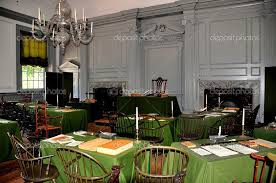On the first trip, I visited a couple of hospitals in New Jersey. To get there, I flew to Philadelphia, which isn’t in New Jersey, so I was a bit surprised. I shouldn’t have been: if I’d been better informed on the geography I’d have known that Philadelphia is right on the Pennsylvania-New Jersey border and the hospitals I was going to were close by.
Nothing more natural, then. My destination was in a different state, but the same nation. And yet, it might not have been. In the early years of the United States, that name was definitely a plural – people talked of “these” United States. Only later did USA become a singular noun, as the federation increasingly subsumed the states.
And yet I suspect that had the states remained separate, I would nonetheless have flown to Philadelphia to reach southern New Jersey. The Americans are pragmatists. Their pragmatism would have demanded open borders and easy travel across them for business.
In the second trip, I attended a meeting of Italian doctors in the Alpine resort of Cortina d’Ampezzo. It’s in the Veneto, the province of Venice, and perhaps it would have made sense to fly there and drive up. Somehow, though, I didn’t feel like doing that and taking the long haul up from the plain into the mountains.
Perhaps I just didn’t like the idea of a plane to a plain.
So instead I flew to a mountain airport, at Innsbruck. That however isn’t even in Italy. It’s in Austria. Hiring a car there to drive to Italy simply wasn’t a problem, though. Indeed, within half an hour of leaving the airport I was driving over the spectacular countryside of the Brenner Pass and crossing the border into Italy. However, I only knew that I’d entered another country because a road sign told me: no one flagged me down, no one checked my papers, no one made any more fuss about that border than about the one between Pennsylvania and New Jersey.
The change in language might have been striking, but not even that was entirely the case. Innsbruck is in the Austrian Province of Tirol. The other side of the border was the Province which has a double name, Süd-Tirol or Alto Adige, with the first, German name, given before the second, Italian one. What was true of the Province was true of the towns, such as Kiens/Chienes, Brixen/Bressanone and several gloriously literal ones, such as Neunhäusern (literally nine houses)/Nove Case (I leave the translation as an exercise to you).
 |
| Frozen Alpine lake: Lago di Landro also known as the Dürrensee |
That was during the First World War which brought to an end the Austro-Hungarian Empire he’d been fighting with, as one of its consequences, the detachment of Süd-Tirol from Austria and its incorporation as Alto Adige into Italy.
 |
| The monument to General Cantore at Cortina d'Ampezzo |
It’s rather like Pennsylvania and New Jersey. It strikes me, at least, that things are altogether better that way. Free travel, open borders, easy communication. It feels better than walls and bullets.
That leaves me troubled by one question. Given all that, why on earth has a majority of my countrymen opted not to support the organisation that makes all that possible, the EU, by remaining a member? Why has it decided instead to withdraw and prefer barriers to passes?
And why on earth have the Americans elected a man who specifically wants to build a wall along the southern border, instead of seeking solutions in good neighbourliness and openness?











